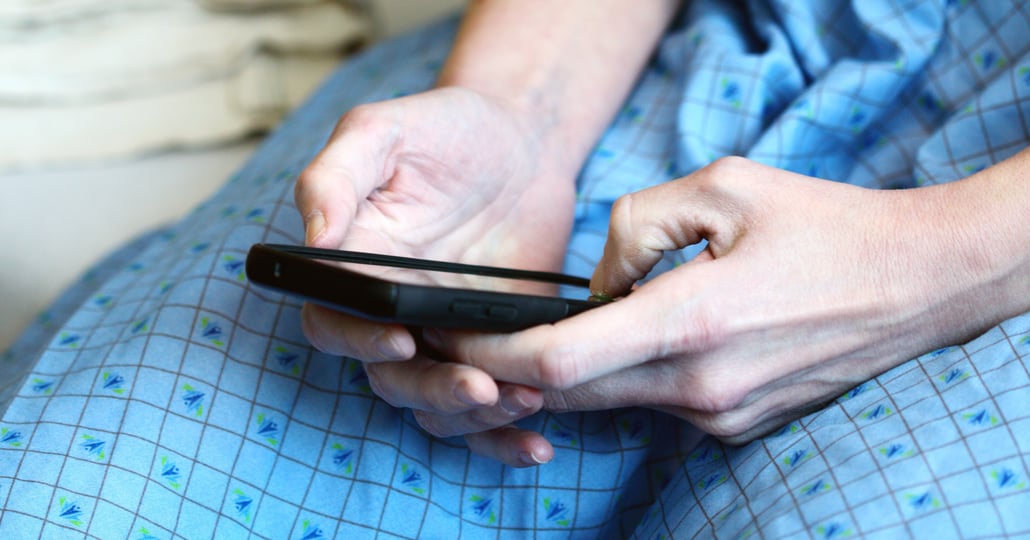7 Benefits of a Hospital Electronic Meal Ordering System
7 minute read | 24/09/2021

Many hospitals around the UK aim to introduce digital menus by 2022, but this hasn't necessarily been the case for most Trusts. Unfortunately, many outdated meal processes still exists – with rigid and restricted ordering for patients that rely on paper-based systems that waste resources.
The idea is that digital solutions give the patient more control over their diet while simultaneously making nutrition become an integral part of the care received while in hospital.
"The benefits of technology are potentially great for a relatively small investment with hardware such as tablets capable of being used for digital food services as well as electronic patient records,” an article in Digital Health stated. So what can these solutions deliver?
Here are seven benefits of electronic meal ordering systems.
- Increased flexibility
- Faster speed
- Better choice
- Reduced waste
- Improved health
- Reduced cost
- Enhanced patient satisfaction
1. Increased flexibility
Patients are usually strapped into set meals at set times, which might not fit their tastes, requirements or the times they prefer eating. Using a meal ordering system allows hospitals to remain flexible, enabling patients to order and update those orders as and when they see fit.
This also means that patients no longer have to wait for a healthcare professional to collect their order. Today, most patients have a smartphone or smart device and ordering can be done by conveniently accessing the ordering system, choosing what they want and finalising the order. It’s an incredibly simple change that gives patients a little more control over their hospital experience.
2. Faster speed
Along with flexibility comes an increase in speed.
Using an electronic meal ordering system means that meals are automatically logged and processed then and there, meaning staff can see what is being made and where it will be going.
This is in comparison to older meal ordering systems, where a tickbox was checked on a piece of paper, collected, then given back to staff. Methods like these are old-fashioned and could sometimes be affected by human error.
With a digital solution, orders can be made quickly and accurately as well as save hospital staff time from collecting paper copies at the bedside, allowing them to focus on more pressing matters.
In terms of the time saved, catering staff spend around 1 minute and 30 seconds per interaction with patients. With 30% ( which equates to around 650 beds) of patients usingBYOD electronic meal ordering, that’s 2.7 hours saved a day per catering staff.
3. Better choice
Conventional menus have the restriction of print - how much you can physically fit on a page. Digital menus overcome this challenge, allowing more to be added.
Similarly, this type of ordering also means that kitchen staff are more proactive when it comes to sourcing ingredients. Food choices can be analysed to see which items are popular, dietary requirements are more readily catered for and meal sizes can even be bespoke.
4. Reduced waste
Waste is consistently an issue in hospitals. It’s always going to exist, but large amounts of it may represent unnecessary costs and/or a lack of accuracy. According to Wrap, 0.5 kilograms of food waste is produced per patient per week.
From 2019 to 2020, 6,228 tonnes of food waste was produced and disposed of. This is a huge amount, representing costs of both sourcing and disposal. Within this number, a large portion of that will be food that was wasted simply due to human error or poor management.
Electronic meal ordering systems reduce waste in several ways:
- Improved accuracy in what meals are being made means that fewer people are likely to either not finish or reject what has been made for them.
- Insight over what has been ordered means that more accurate amounts of ingredients can be sourced and less goes to waste.
- As meal sizes and dietary requirements can be better catered for, there’s a smaller chance of wasted meals.
- Electronic systems allow meals to follow patients if they move beds, or be cancelled if they are discharged.
Reduced waste production also means a reduced need for waste collection, reducing the overheads associated with waste management provided by third parties.
Get the Latest Insights on the Future of Patient Experience
Our 'Shaping the Future of Healthcare Together' webinar is now available on-demand.
Our panel address key questions while discussing how they're working to change the future of patient experience.
Access your recording of the webinar by filling out the form.

5. Improved health
It doesn’t need repeating that the purpose of a hospital is to improve the health of those in it and one of the first pillars of that is nutrition. Ensuring good nutrition for patients is vital in their recovery process, as well as maintaining their improved health well into the future.
Using an electronic meal ordering system means that dieticians can review patient meal choices and make the adjustments necessary for the patient’s best recovery. This might be in the form of choosing low-salt options for patients with heart problems or sugar-controlled options for those with diabetes.
It’s just another way that digital menus can increase visibility over a patient’s care lifecycle.
6. Reduced cost
First of all, an electronic meal ordering system can be hosted and managed by an experienced provider (such as Bring Your Own Device, hosted by Datasym) means there’s no need for the purchase and onboarding of large amounts of hardware, as this solution is accessible from a patient’s smartphone. With this solution, you can redeploy staff to provide a better service to those that want to use it.
Secondly, there’s no need for the costs of printing and distributing menu cards. Consider how many menus you would need — a rough cost for printing menus is around £8,000 per year, more if you use colour menus. Switching to an electronic meal ordering system ensures this is a cost you don't incur.
Thirdly, with greater visibility and accuracy surrounding meal ordering, fewer ingredients need to be ordered in the first place.
This software is then integrated into other healthcare systems, such as a Patient Engagement/Entertainment System (PES) by companies like us at WiFi SPARK.
Based on live data from Datasym, electronic meal ordering systems can save:
- £182,000 on annual food wastage.
- 14% on annual food costs.
For hospitals, this is a respectable chunk of their overheads that they can recoup.
7. Enhanced patient satisfaction
Hospitals aren’t merely places of results and running them well isn’t merely about reducing costs and improving efficiencies. They’re also places where people have the opportunity for good, healing experiences. Food is not only a necessity, but it is also a comfort for some. If patients are met with no control over their diet or inaccurate meal ordering, they’re going to have a poorer hospital experience.
When patients can choose their own meals, they’re immediately given more independence, which some can feel is removed when in hospital. Additionally, the patient is enabled to have more control and be more invested in their time there, as well as their care.
Patients can be more independent when it comes to their diet, choosing what they’re eating and when they’re eating. Solutions like these also allow family members to assist and order for them, while also being able to see what’s being ordered when they’re not around.
A solution like this is just one example of how hospitals can utilise patient-facing technology to improve engagement and the care experience that so many people go through every year. To find out what exciting, useful features are being released by WiFi SPARK, features that bring many improvements to the care environment, read our downloadable document below.
Our latest features for healthcare environments
Transforming patient experience is a key focus within the healthcare sector today. Much of this transformation is afforded by fit-for-purpose technology designed with the patient in mind. But what’s available?
Introducing SPARK Fusion®
SPARK Fusion® is our end-to-end infotainment solution hat's designed to revolutionise the NHS. Alongside all of the the benefits, one of the key features of SPARK Fusion® is its digital meal ordering, that alleviates the pressure of on-the-spot, or in-the-moment paper-based menu engagement and gives patients more freedom over their choices.
For more information, download our product brochure and explore how SPARK Fusion® can help to improve the patient experience within your Trust.
About the author
Rebecca O'Donovan
Becky is the Marketing Director at SPARK TSL, of whom she has worked for since 2012. She is responsible for high-level marketing strategy focusing on lead generation and aiding the vision of the business to ensure business growth.
More articles by the author
Related articles
 Company News
Company News
Helping the NHS achieve its goal of rolling out virtual meal ordering
“NHS hospitals will be required to implement digital menus by 2022 under recommendations in a review of ...
 Patient Experience
Patient Experience
4 Challenges in Improving Quality of Care & How to Overcome Them
In this blog, we'll explore four challenges in improving the quality of healthcare and how to overcome them ...
 Healthcare Industry
Healthcare Industry
What's Next in Hospital Patient Entertainment Systems? | SPARK TSL
When hospitals started to offer television in the early 2000s, the government saw it as a triumphant drive ...


